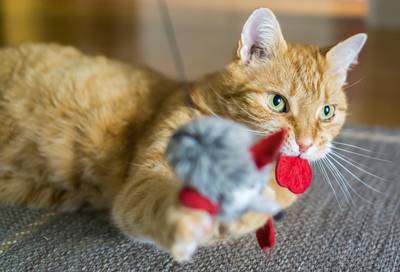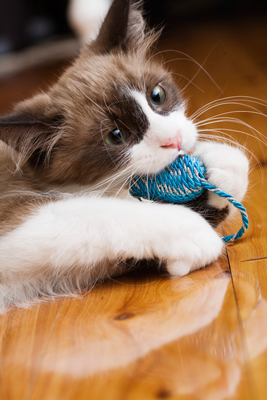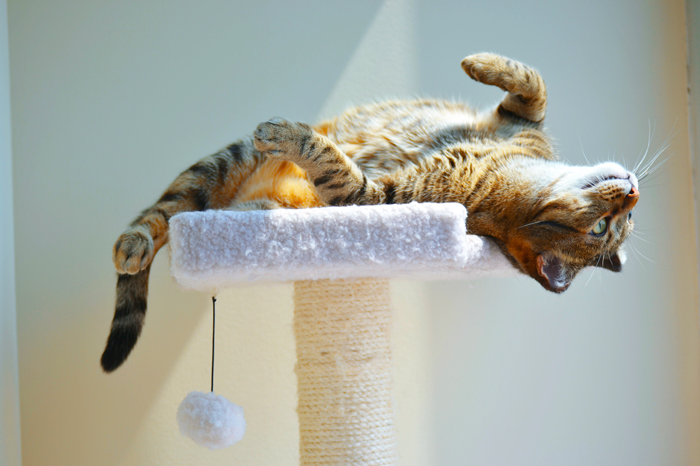Regular exercise is as essential for felines as it is for people.
There’s a quote from “The Little Prince” that has always stayed with me.
“People have forgotten this truth,” the Fox said. “But you mustn’t forget it. You become responsible forever for what you’ve tamed.” —Antoine de Saint-Exupéry, The Little Prince

While the Fox was speaking to The Little Prince about friendship, I like to apply that quote to the care of animals. It’s especially important to remember in regards to caring for cats.
Cats have chosen to self-domesticate throughout history, but we all have our part to play in caring for these animals. Once we domesticate an animal, we must provide for it and that includes all of the things they no longer has access to—like hunting.
In a natural environment, cats get plenty of exercise. From hunting prey to playing with littermates, they are always on the move. However, when kept as pets, their owners are responsible for ensuring they remain active. If you become lax in offering them plenty of time to play, they can become overweight or even resentful and are more likely to take out their frustration on you and/or your household.
Exercise is an important part of any animal’s life. However, it’s critically important for cats; they are naturally designed to be active. To neglect this part of their world is to invite bad behavior and physical problems into your life.
Therefore, if you’re having problems with your cat spraying, biting, clawing furniture, or anything else, you should first eliminate any physical issues. However, once you’ve done that, exercise may be the answer to your dilemma.
When to Exercise

Cats are crepuscular (most active at dusk and dawn) by nature, which often makes dusk and dawn the best time to play. This is usually when they are most alert and ready to accept new stimuli.
However, a cat’s schedule depends on the cat. Every cat is different, which is just one reason why we love him or her so much.
Observe your cat’s schedule. If she begins causing problems every afternoon at 2 p.m., then that’s when you want to engage her with play. If she sit sin the window and strikes out at every bird or cat she sees outdoors each evening at 8 p.m., then that’s the time to get the toys out.
If your cat doesn’t seem to want to play, then it’s time to introduce some new toys….
Choosing a Toy

Exercising cats will depend largely on their personalities. The best play for cats stimulates all of their senses, but motivating your cat to play will usually involve one or more of the following activities.
Chase/Hunt: Wands and laser pointers can be used to encourage chasing/hunting. Wand toys, in particular, can entice your cat into movement.
Stalk: Common stalking toys include anything that rolls (such as small felt or Mylar balls), motorized toys and interactive toys that hide treats or catnip. There are myriad toys that focus on “stalking” skills. If you’re having problems getting your cats engaged, you might want to consider building an outdoor cat enclosure.
Pounce: Pouncing toys are focused on “the kill,” meaning things your cat can pounce on such as toy mice, catnip toys and interactive toys that entice cats to attack or any other type of “kill it” toys.
Climb: Climbing is crucial for cats because it helps them naturally shed claws (cats regularly shed the sheaths of their claws to keep them extra pointy forever). It’s also a great workout. Most cats love to be up high where they can lord over us all. Even if your cat doesn’t like to climb, you should be sure to provide a scratching posts around your home if you want to save your furniture.

Exploring: Exploration is a big part of your cat’s life. It’s important to provide many places she can explore. If you’re in a small place, a plain old box r two will do nicely.
If you think your cat might enjoy the great outdoors (and what cat doesn’t?), then be sure you put her on a harness and leash and consider having her wear a GPS tracker in case she gets loose.
No matter what type of activities your cat prefers, be sure you choose at least one to do regularly. Cats need help becoming active and ignoring this necessity jeopardizes your cats mental and physical well-being.
About the Author: Stacy Mantle is a fulltime freelance writer, bestselling author and founder of PetsWeekly.com. She resides in the deserts of the Southwest with a few dogs, several cats and a very understanding husband.





